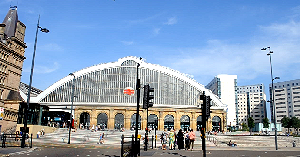|
REPORT CONFIRMS THAT
CONSUMERS ARE PAYING TOO MUCH FOR WATER AND THAT REGULATOR IS
ALLOWING PRIVATE EQUITY PROFITEERING
"THE only way to stop this
rip off is re-nationalisation of this natural monopoly and this has
to be a top priority for the next Labour Party Election Manifesto"
says GMB. GMB, the union for water workers,
commented on a new report from Centre Forum which says that it is
time to end reckless profiteering in the water industry and get a
better deal for consumers. Gary Smith GMB National
Secretary for Utilities said on 17 July 2013 that:- "This
report confirms what GMB has saying for years but our concerns have
been dismissed.
The report finds that:-
► Since 2005 prices for water have been too high, more than required
to run a decent service for customers whilst providing a reasonable
return for investors.
► This has led to very high profits for water companies. These
profits, which are funded out of consumer bills, have not been spent
on improving customer service or for investing in infrastructure.
► Money has been transferred straight to shareholders who have seen
extraordinary returns on their investment.
► Ofwat got things wrong in price reviews after 1999 by
overestimating the cost of capital for water companies.
► The winners have been the shareholders who have used this extra
revenue to borrow billions and transfer it out of the company
through very large dividend payments. The losers are undoubtedly the
public who are paying for it.
► There are allegations of widespread tax avoidance.
► The level of corporate borrowing is
becoming unsustainable.
► The ownership structure means that there is very little public
accountability.
► Most of the largest water companies are owned by private equity
funds and there are no public meetings where management can be held
to account.
► The ownership structures are murky to say the least with strings
of companies dotted around the world's island secrecy jurisdictions
and tax havens.
► This ownership structure makes it difficult for the public to know
what is going on with its water suppliers.
The claim that this rip off could not have been foreseen when this
natural monopoly industry was privatised in
1989 is spurious.
It was known then that the multimillionaire elite in private equity
target income streams from care homes, from pubs, water and other
sectors to cover interest payments on vast borrowings. This has led
to an £111 billion estimate that buyout companies in the UK will
have to refinance over the next 5 years. There will be more
insolvency.
The coalition government will do nothing to correct this as the
people who organized this rip off in the water industry are their
friends and financial backers.
The only way to stop this rip off is re-nationalisation of this
natural monopoly and this has to be a top priority for the next
Labour Party Election Manifesto." |
 |
High Speed Rail
Consultation commences

THE formal consultation on
the High Speed Rail 2 project commenced on Wednesday, 17 July 2013.
The consultation will run until 31 January 2014, with Ministers
announcing the outcome at the end 2014.
Merseytravel is leading and coordinating the consultation in the
Liverpool City Region and a combined response to that consultation
in relation to High Speed 2, Phase 2 will be provided.
Under the High Speed Rail 2, Phase 2 scheme, journey times between
Liverpool (Merseyside) and London will improve significantly to 1
hour 36 minutes, over half an hour quicker than existing West Coast
Mainline services. The new line will also see capaCity on existing
Inter City Lines being freed up for greater freight and local
capaCity, bringing additional benefits to the region.
City Region leaders have welcomed the current HS2 proposals, under
which trains to and from Liverpool will travel at maximum speed
between London and Crewe, before branching off to use the existing
Inter City Lines between Crewe and Liverpool Lime Street.
However, the greatest potential and benefit for the Liverpool City
Region would truly be unlocked by the creation of a dedicated high
speed line into a new Liverpool City Centre Terminus. This would
free up capacity between Crewe and Liverpool, which under the
current proposal would still be taken up by the classic compatible
high speed trains and would also be a catalyst for major
regeneration opportunities around the station.
Merseytravel and partners will therefore be continuing to make the
case strongly to the government that full high speed rail services
must come through to Liverpool.
There are potentially very significant economic benefits for the
Liverpool City Region from the project.
Official estimates put the overall economic benefits of the High
Speed Rail 2, Phase 2 project, that would bring full speed trains to
Crewe and then on to Liverpool at standard speeds, at £48.2billion
for Transport Benefits with the Wider Economic Benefits at
£63.6billion.
It is estimated that in the region of 60,000 jobs could be created
by the Phase 2 project overall.
Councillor Liam Robinson, Chair of Merseytravel, said:- "It is
vital that we do all we can to ensure that the Liverpool City Region
receives a proper share of the transport and economic benefits of
High Speed Rail 2. The scheme in its current form will bring us very
significant benefits for business, employment and for the travelling
public. Should we be successful in persuading government of the
benefits of bringing the full High Speed route in to Liverpool
itself, this would clearly be even better news for the City Region.
We expect that formal Information events will be held between
October and December this year and we will be working to ensure
engagement of the business community, public and voluntary sectors
and general public." |